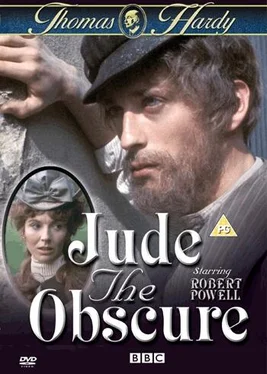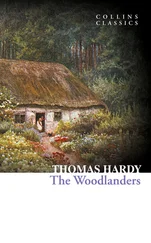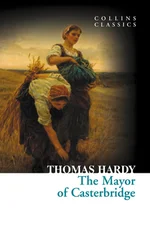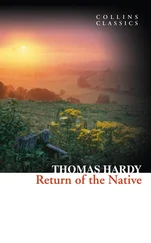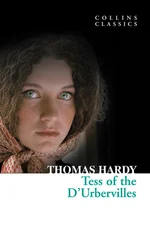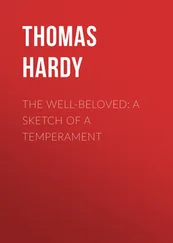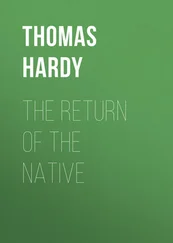Half-paralyzed by the strange and consummate horror of the scene he let Sue lie, cut the cords with his pocket-knife and threw the three children on the bed; but the feel of their bodies in the momentary handling seemed to say that they were dead. He caught up Sue, who was in fainting fits, and put her on the bed in the other room, after which he breathlessly summoned the landlady and ran out for a doctor.
When he got back Sue had come to herself, and the two helpless women, bending over the children in wild efforts to restore them, and the triplet of little corpses, formed a sight which overthrew his self-command. The nearest surgeon came in, but, as Jude had inferred, his presence was superfluous. The children were past saving, for though their bodies were still barely cold it was conjectured that they had been hanging more than an hour. The probability held by the parents later on, when they were able to reason on the case, was that the elder boy, on waking, looked into the outer room for Sue, and, finding her absent, was thrown into a fit of aggravated despondency that the events and information of the evening before had induced in his morbid temperament. Moreover a piece of paper was found upon the floor, on which was written, in the boy's hand, with the bit of lead pencil that he carried:
Done because we are too menny.
At sight of this Sue's nerves utterly gave way, an awful conviction that her discourse with the boy had been the main cause of the tragedy, throwing her into a convulsive agony which knew no abatement. They carried her away against her wish to a room on the lower floor; and there she lay, her slight figure shaken with her gasps, and her eyes staring at the ceiling, the woman of the house vainly trying to soothe her.
They could hear from this chamber the people moving about above, and she implored to be allowed to go back, and was only kept from doing so by the assurance that, if there were any hope, her presence might do harm, and the reminder that it was necessary to take care of herself lest she should endanger a coming life. Her inquiries were incessant, and at last Jude came down and told her there was no hope. As soon as she could speak she informed him what she had said to the boy, and how she thought herself the cause of this.
"No," said Jude. "It was in his nature to do it. The doctor says there are such boys springing up amongst us—boys of a sort unknown in the last generation—the outcome of new views of life. They seem to see all its terrors before they are old enough to have staying power to resist them. He says it is the beginning of the coming universal wish not to live. He's an advanced man, the doctor: but he can give no consolation to—"
Jude had kept back his own grief on account of her; but he now broke down; and this stimulated Sue to efforts of sympathy which in some degree distracted her from her poignant self-reproach. When everybody was gone, she was allowed to see the children.
The boy's face expressed the whole tale of their situation. On that little shape had converged all the inauspiciousness and shadow which had darkened the first union of Jude, and all the accidents, mistakes, fears, errors of the last. He was their nodal point, their focus, their expression in a single term. For the rashness of those parents he had groaned, for their ill assortment he had quaked, and for the misfortunes of these he had died.
When the house was silent, and they could do nothing but await the coroner's inquest, a subdued, large, low voice spread into the air of the room from behind the heavy walls at the back.
"What is it?" said Sue, her spasmodic breathing suspended.
"The organ of the college chapel. The organist practising I suppose. It's the anthem from the seventy-third Psalm; 'Truly God is loving unto Israel.'"
She sobbed again. "Oh, oh my babies! They had done no harm! Why should they have been taken away, and not I!"
There was another stillness—broken at last by two persons in conversation somewhere without.
"They are talking about us, no doubt!" moaned Sue. "'We are made a spectacle unto the world, and to angels, and to men!'"
Jude listened—"No—they are not talking of us," he said. "They are two clergymen of different views, arguing about the eastward position. Good God—the eastward position, and all creation groaning!"
Then another silence, till she was seized with another uncontrollable fit of grief. "There is something external to us which says, 'You shan't!' First it said, 'You shan't learn!' Then it said, 'You shan't labour!' Now it says, 'You shan't love!'"
He tried to soothe her by saying, "That's bitter of you, darling."
"But it's true!"
Thus they waited, and she went back again to her room. The baby's frock, shoes, and socks, which had been lying on a chair at the time of his death, she would not now have removed, though Jude would fain have got them out of her sight. But whenever he touched them she implored him to let them lie, and burst out almost savagely at the woman of the house when she also attempted to put them away.
Jude dreaded her dull apathetic silences almost more than her paroxysms. "Why don't you speak to me, Jude?" she cried out, after one of these. "Don't turn away from me! I can't bear the loneliness of being out of your looks!"
"There, dear; here I am," he said, putting his face close to hers.
"Yes… Oh, my comrade, our perfect union—our two-in-oneness—is now stained with blood!"
"Shadowed by death—that's all."
"Ah; but it was I who incited him really, though I didn't know I was doing it! I talked to the child as one should only talk to people of mature age. I said the world was against us, that it was better to be out of life than in it at this price; and he took it literally. And I told him I was going to have another child. It upset him. Oh how bitterly he upbraided me!"
"Why did you do it, Sue?"
"I can't tell. It was that I wanted to be truthful. I couldn't bear deceiving him as to the facts of life. And yet I wasn't truthful, for with a false delicacy I told him too obscurely.—Why was I half-wiser than my fellow-women? And not entirely wiser! Why didn't I tell him pleasant untruths, instead of half-realities? It was my want of self-control, so that I could neither conceal things nor reveal them!"
"Your plan might have been a good one for the majority of cases; only in our peculiar case it chanced to work badly perhaps. He must have known sooner or later."
"And I was just making my baby darling a new frock; and now I shall never see him in it, and never talk to him any more! … My eyes are so swollen that I can scarcely see; and yet little more than a year ago I called myself happy! We went about loving each other too much—indulging ourselves to utter selfishness with each other! We said—do you remember?—that we would make a virtue of joy. I said it was Nature's intention, Nature's law and raison d'être that we should be joyful in what instincts she afforded us—instincts which civilization had taken upon itself to thwart. What dreadful things I said! And now Fate has given us this stab in the back for being such fools as to take Nature at her word!"
She sank into a quiet contemplation, till she said, "It is best, perhaps, that they should be gone.—Yes—I see it is! Better that they should be plucked fresh than stay to wither away miserably!"
"Yes," replied Jude. "Some say that the elders should rejoice when their children die in infancy."
"But they don't know! … Oh my babies, my babies, could you be alive now! You may say the boy wished to be out of life, or he wouldn't have done it. It was not unreasonable for him to die: it was part of his incurably sad nature, poor little fellow! But then the others—my own children and yours!"
Читать дальше
